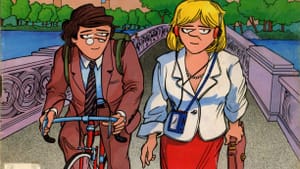Stay in the Loop
BSR publishes on a weekly schedule, with an email newsletter every Wednesday and Thursday morning. There’s no paywall, and subscribing is always free.
They call me the Yuppie specialist
My 15 minutes of fame

Andy Warhol famously predicted that in the future we’d all be famous for 15 minutes. At one level, it was a fatuous remark — many of us don’t want to be famous. And Warhol provided no clue as to when fame would strike us or how we’d achieve it.
But at another level, Warhol’s quip succinctly summarized modern society’s insatiable hunger for celebrities and the speed with which we tire of them. (In the 1954 Dean Martin-Jerry Lewis film Living It Up, a country doctor and his supposedly terminally ill patient were honored with a ticker-tape parade down Broadway in New York, only to find themselves sweeping up the refuse at the parade’s end, having already been forgotten by their host city.)
Some of us really work at fame. This past February, BSR’s Roz Warren urged her fellow writers to promote themselves via Facebook, Twitter, LinkedIn, Instagram — the sort of work that used to be performed by publicists. (Click here.)
At the other extreme are folks like me, who plant a lot of seeds and then sit around waiting for them to sprout. And sure enough, sometimes they do. My 15 minutes arrived last month, only 35 years after the seed was planted, and for a reason I could not have predicted.
Moderately derogatory?
The year was 1980. Chicago Magazine asked me to write an article about urban gentrification and Chicago’s alleged “urban renaissance.” That article, which appeared that May, included this paragraph:
“Something is occurring in Chicago, or at least in the fashionable lakefront neighborhoods that so many observers (including, God knows, this magazine) often seem to confuse with the city as a whole. Real-estate prices have skyrocketed. Lofts and townhouses are being rehabilitated. Some 20,000 new dwelling units have been built within two miles of the Loop over the past ten years to accommodate the rising tide of ‘Yuppies’ — young urban professionals rebelling against the stodgy suburban lifestyles of their parents. The Yuppies seek neither comfort nor security, but stimulation, and they can find that only in the densest sections of the city.”
It seemed innocuous at the time. But last month — by which time the Yuppies I wrote about would have been ready for Social Security — the New York Times published an extensive lifestyle article about the decline of American Yuppies. Its second paragraph contained this observation:
“This moderately derogatory term for young urban professionals, or young upwardly mobile professionals (given more kick with the addendum of ‘scum’), is believed to have first appeared in print in a 1980 Chicago Magazine article by Dan Rottenberg, though he does not take credit for coining it. A Google Ngram search reveals that the word’s usage in books began ascending steeply in 1983 and reached its apex a decade later.” (To read the entire Times article, click here.)
Change of lexicon
I declined credit for coining the term Yuppie because I didn’t coin it: Yuppie seemed to be in pretty wide circulation at the time, just as the term WASP (for white Anglo-Saxon Protestants) was widely circulated before E. Digby Baltzell used it in his 1964 book, The Protestant Establishment. Nevertheless, after 35 years I became an instant celebrity, just as Andy Warhol promised.
First Chicago Magazine dug into its archives, digitized my 1980 article and posted it online. (To read it, click here.) Then a Chicago Magazine editor phoned and taped a 45-minute interview with me about the relative virtues of Chicago, Philadelphia, and New York, as if I were some sort of urbanologist. That interview was posted on the magazine’s website last week, under a subhead that explained:
“Decades after he helped change our lexicon, a longtime editor and urban observer reflects on what makes a healthy city.” And visitors to the site have been debating my off-the-top-of-the-head remarks ever since. (Click here.)
“The blossom cannot tell what becomes of its odor,” noted the 19th-century preacher Henry Ward Beecher, “and no man can tell what becomes of his influence.” He might have added: Especially if you spot some really important trend, like Yuppies.
So have patience, my celebrity-starved friend. Your 15 minutes will arrive any day now.
Sign up for our newsletter
All of the week's new articles, all in one place. Sign up for the free weekly BSR newsletters, and don't miss a conversation.
 Dan Rottenberg
Dan Rottenberg